Pre-conditions for product safety:
- Cultivation areas and contract farmers
- Selection of cultivation areas and contract farmers
- Requirements to be fulfilled by contract farmers
- Production planning and implementation
- Harvest planning and implementation
- Transportation to the packaging facility
- Processing and packaging
- Delivery to customers
1. Cultivation areas and contract farmers
The GŁnaydin Group is committed to controlled integrated agriculture and a holistic approach towards cultivation, processing, packaging, shipping/delivery and marketing of produce including its associated multi-facetted ethnical, cultural and social aspects.
Every one of Günaydın’s contract farmers undertakes to fully comply with the currently valid guidelines of our Quality Manual. Strict controls of compliance with those guidelines guarantee our customers origin of the fruits as stated, environmentally friendly agricultural practices and the highest quality and food safety standards.
2. Selection of cultivation areas and contract farmers
As stated in our Quality Manual, the production process begins with the selection of cultivation areas and contract farmers. The land is selected in accordance with ICM (Integrated Crop Management) principles for sustainable agriculture in areas that offer ideal conditions for highest quality.
Potential agricultural land identified by our agro-engineers is scrutinised with the aid of a 43-question survey. Among others, we request detailed information about the exact location of the cultivation area, pollution risks, the risk of pesticide contamination and the level of education of the growers, as well as their compliance with rules and regulations and their knowledge of human safety and environmental issues. Every answer is awarded points.
Cultivation areas and farmers scoring over 70 points are ranked as GLOBALGAP land. Upon contract signing, selected contract farmers receive a grower's ID with their individual GLOBALGAP-Code together with a duties record book and a documentation log which they must keep regularly.
3. Requirements to be fulfilled by contract farmers
Growers who participate in the GLOBALGAP programme are obliged to take part in training measures where they receive information about the various phenological development phases of plants and the agricultural interventions they require. They are also informed about the concept of integrated pest management and pest control programmes, about beneficial organisms and aspects to be considered during crop spraying as well as about GLOBALGAP control points.
Grower training is planned and carried out at the beginning of each year. Participants receive our Quality Manuals, the GLOBALGAP Guidelines and brochures on pest control.
The seminar curriculum comprises the following topics:
- Health and environmental protection
- Consumer protection
- GLOBALGAP Guidelines
- Application of IPM techniques
- Cultivation and pruning techniques
- Fertilizer programmes
- Irrigation techniques
We place great emphasis on theoretical and practical training of our contract farmers as well as other growers who are not part of our system. We remind them that they and their families are primary consumers when it comes to food safety, and that in the long run only integrated controlled agriculture will improve their situation.
Over the last couple of years the Günaydin Group, as the first company of its kind, has organised 210 GLOBALGAP training seminars at 73 agricultural centres in Turkey and distributed 5,000 copies of the GLOBALGAP Guidelines for Cherries and Grapes among participating farmers. The objective of these training measures is to generate awareness for food safety and consumer protection issues and thus assure the protection of human health and the environment. We are convinced that only those who are committed to those principles and live by them in their daily business routines will prevail in the market.
For the cultivation areas, a field card must be kept by the contract farmers. In this card, they register all soil- and plant-related measures they take. Those cards must be regularly sent to our agro-engineers who file them in the contract farmer’s individual folder. Cultivation areas with incomplete documentation are not considered for harvesting and marketing.
Documentation
The contract farmers must keep a field card for the cultivation areas. In this card, they register all soil- and plant-related measures they take. These cards must be regularly sent to our agro-engineers, who file them in the contract farmer’s individual folder. Cultivation areas with incomplete documentation are not considered for harvesting and marketing.
Monitoring and control
Our agro-engineers continuously monitor our contract farmers, who are obliged to allow our engineers access to all areas of their farm during controls. To improve the efficiency of our control system we organise both scheduled and spot checks at irregular intervals.
4. Production planning and implementation
The starting point for high quality standards in the broadest sense is healthy soil and good planning. On the basis of previous years' results and their thorough analysis, we establish a strategic production and action plan for the coming crop Season. This plan serves as a guideline to our contract farmers for their agricultural activities and outlines the extent of our technical support.
GŁnaydin employs one GLOBALGAP coordinator, one chemist, two food technicians and four agro-engineers. Our GLOBALGAP Quality Manual specifies all procedural steps of grape cultivation including the norms for grape quality. The same procedures also apply to cherries.
5. Harvest planning and implementation
Harvest planning begins after maturation in the individual regions. The plan addresses the various aspects of labour, equipment and transport demand, and sets a schedule.
Actual harvesting depends on the status of fruit maturity and fruit health. The required interval between pest control measures and harvest time is strictly adhered to; produce is collected only after residue analyses have proved them to be safe.
Immediately prior to harvest, samples are taken in the cultivation area and sent to our accredited contract laboratory Eurofins - Dr. Specht and Partner in Hamburg. The sample is identified with the farmer code. The areas are approved for harvest in accordance with the residue analyses.
The test report of our contract laboratory which we make available to our customers includes the farmer code. This enables our customers to check for themselves that their deliveries comply with residue limits and that currently-valid ARfD values are assured, because we also indicate the farmer code on our consignment note.
Before their employment beings, harvest hands receive training in harvesting and harvesting techniques, together with suitable work clothes and tools. Fruits are hand-picked and collected in small harvesting boxes to protect them and avoid bruising. Small quantities also allow for better selection. The collection boxes are disinfected prior to use and the relevant hygiene regulations are strictly followed.
Every harvesting box carries the field number and the farmer code; after processing and packaging, these are stated on the packaging cartons under the heading “Farmer Code.” The farmer code ensures continuous traceability.
6. Transportation to the packaging facility
The fruit boxes are loaded onto cooling trucks which deliver their load to the central packaging facility in Alasehir / Manisa. Upon acceptance of the produce, the documents are handed over,,the fruit is visually checked and deficient goods sorted out. After pre-cooling, the goods are released for processing and packaging.
7. Processing and Packaging
Employees who come in contact with food must wear protective clothing. The same applies to visitors and persons who enter the facility for business or work purposes and who – in the course of their stay at the plant – may come into contact with food. The protective clothing is provided by the company.
We have established and announced personal hygiene standards to all our personnel. Production management ensures that our employees conscientiously conform to these standards. The hygiene norms are displayed in the plant wherever necessary. These same rules also apply to external visitors.
All employees who work in production safety risk areas are subject to the provisions of our procedural instruction “Medical Check-up.”
All our staff receives training in their respective jobs and suitable working clothes.
8. Delivery to Customers
For delivery to our customers, we use transport vehicles that satisfy the particular conditions of the cargo they carry. Transport vehicles and the conditions of transport are governed by forwarding contracts we execute with forwarders. The dispatch of goods is regulated in our “Dispatch Instruction”.
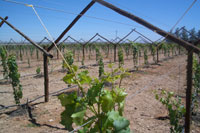
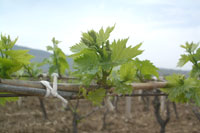
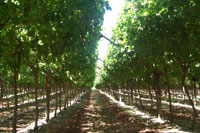
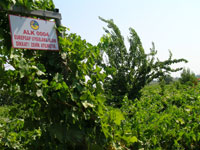
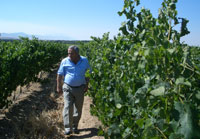
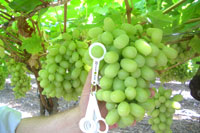
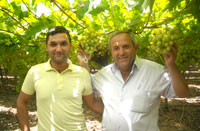
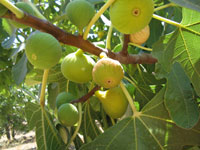
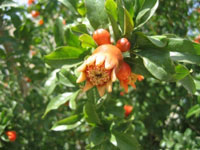
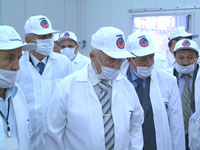
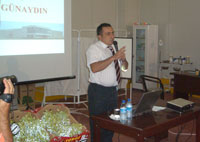
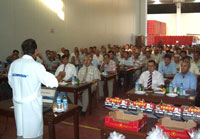
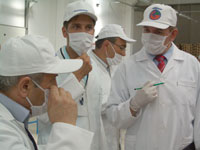
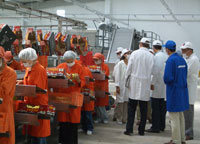
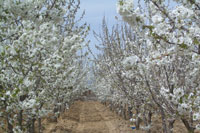
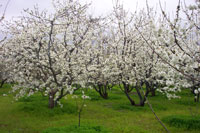
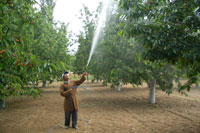
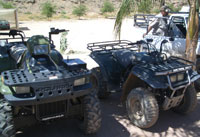
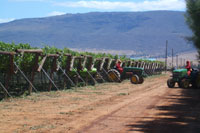
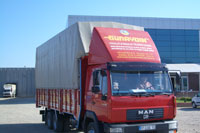
 Measures
Measures


